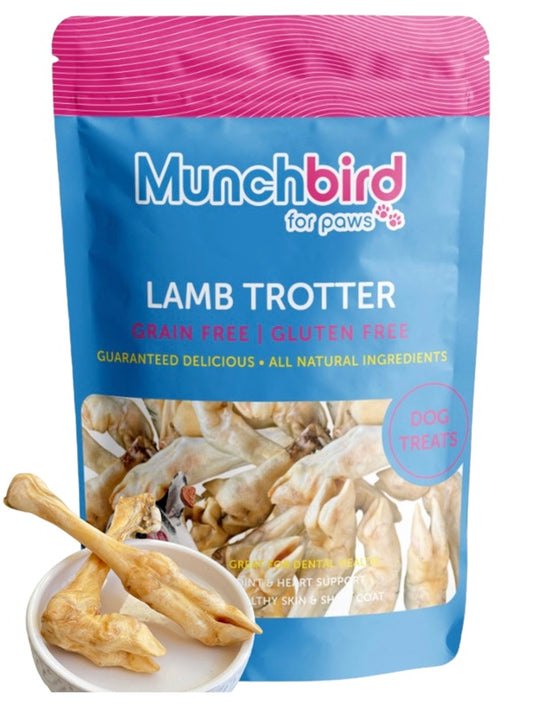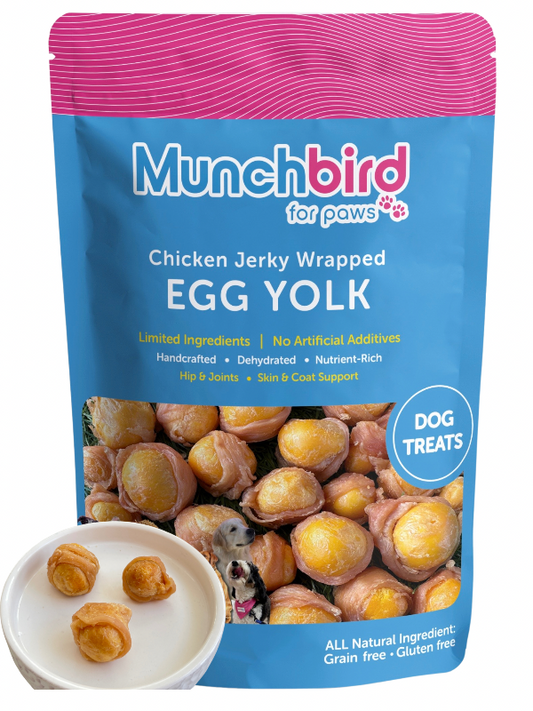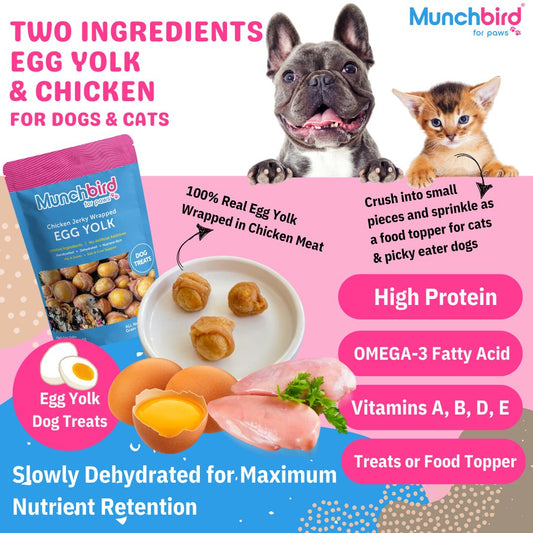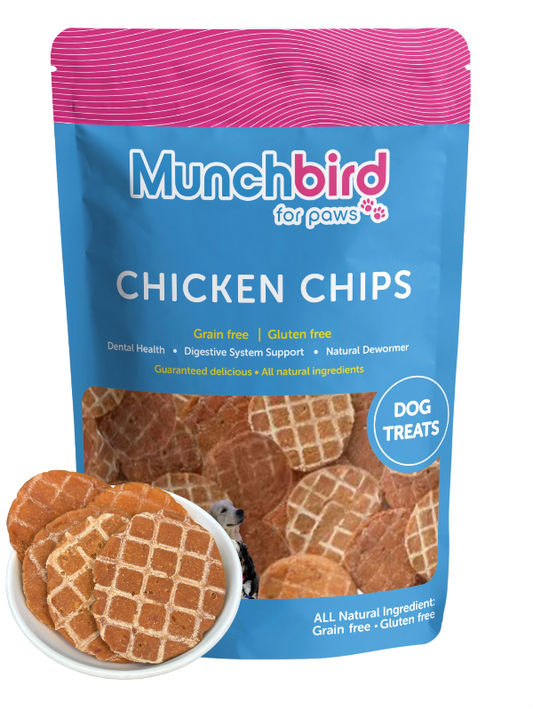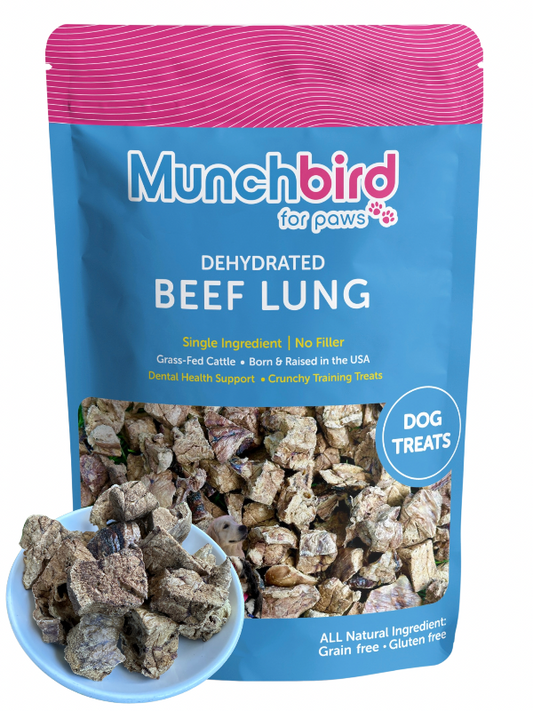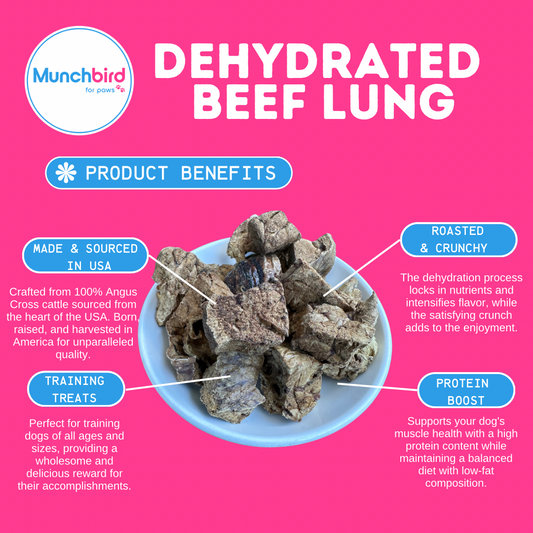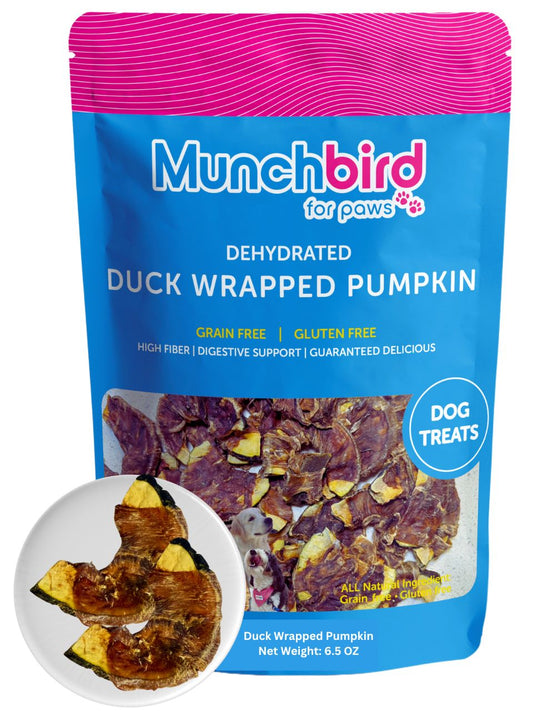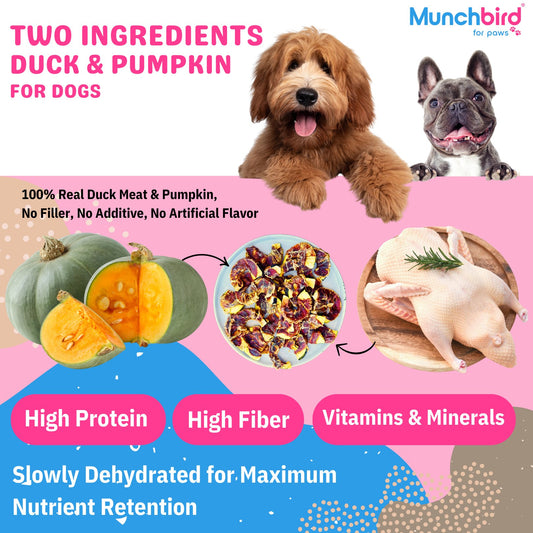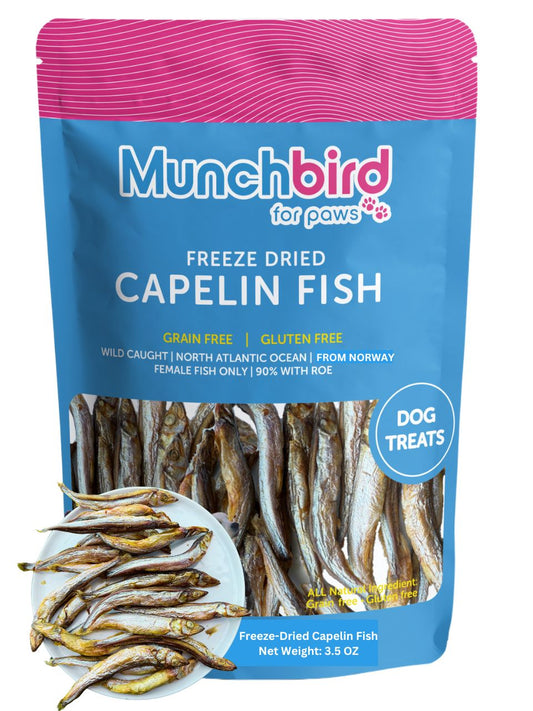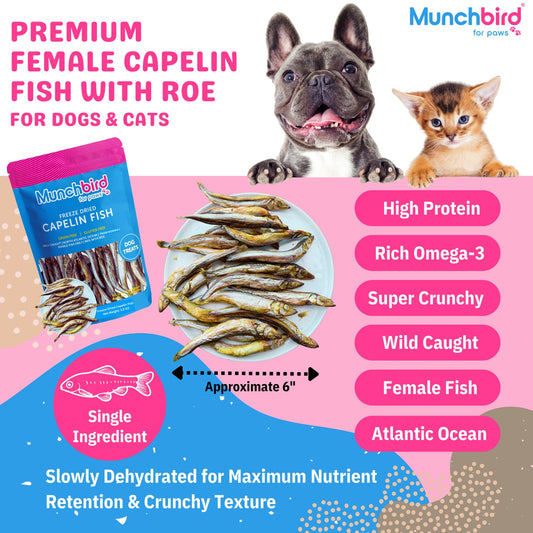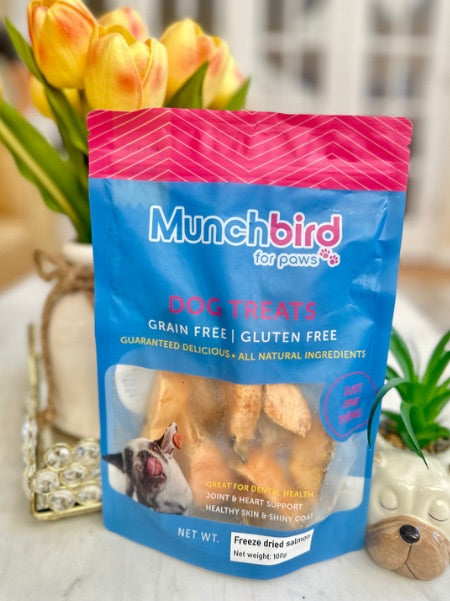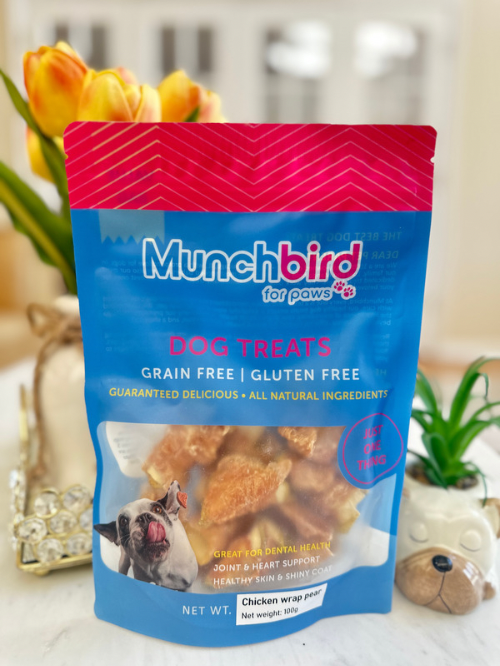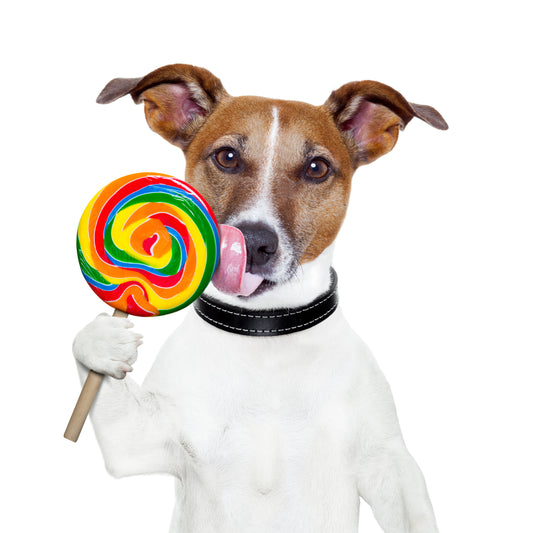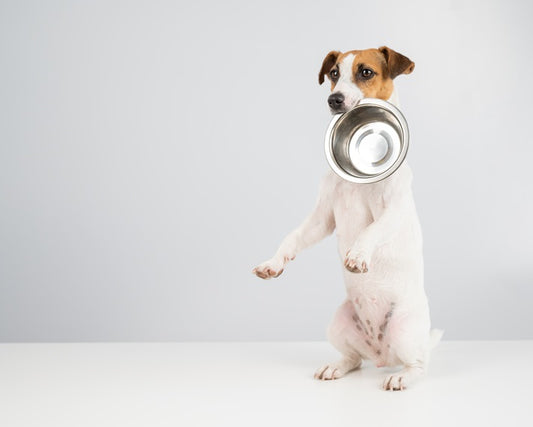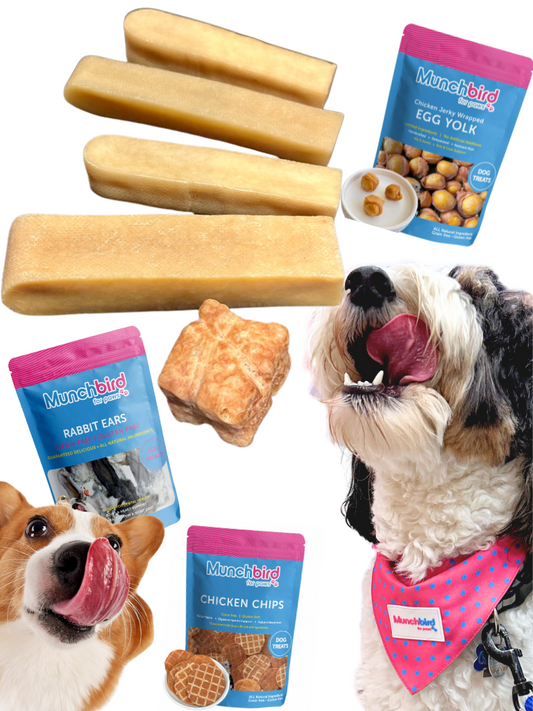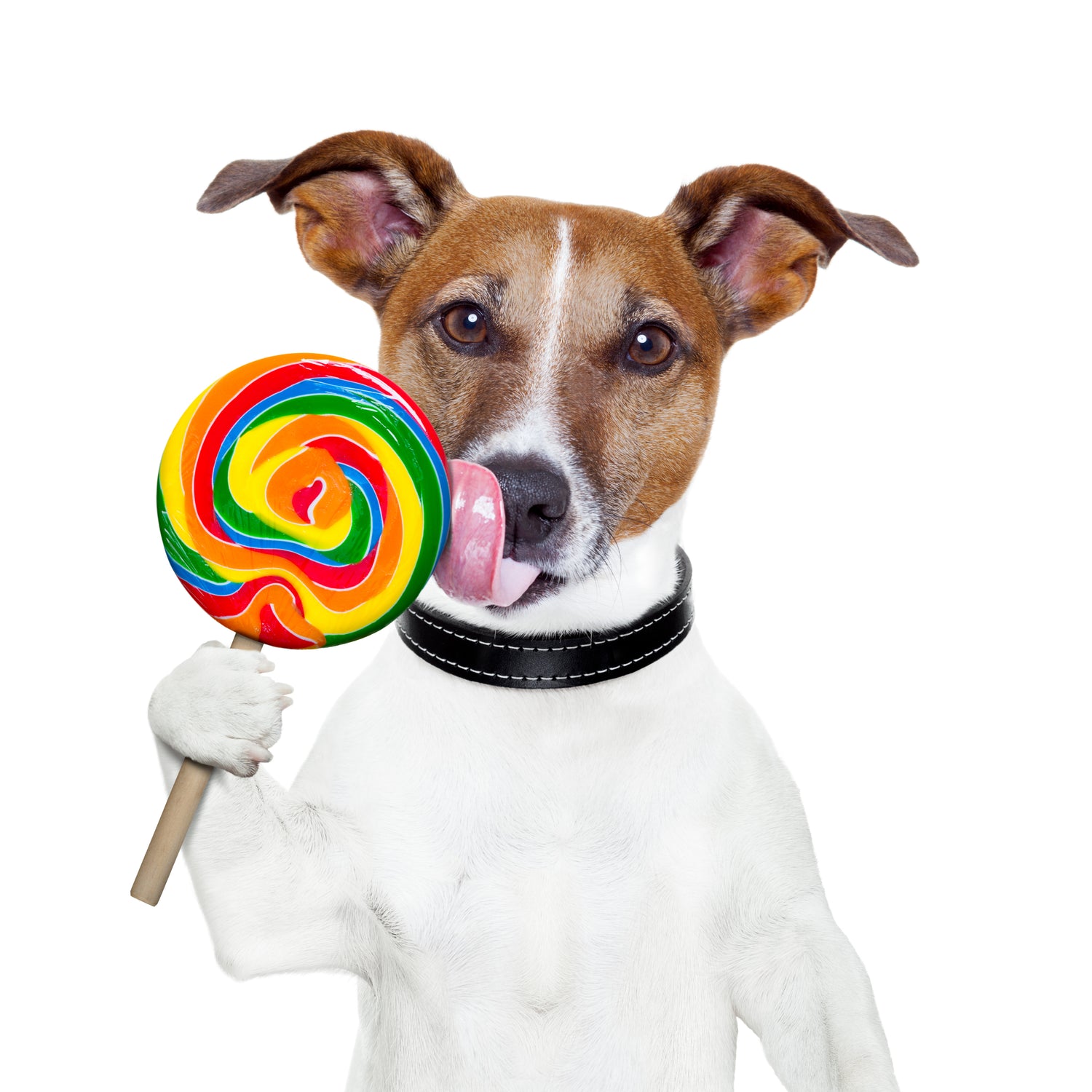
🎉 Limited time offer alert for 2024! Treat your furry friend to our premium Chicken Chips with our Buy 50, Get 1 Free deal. Hurry, this offer won't last long! Upgrade your pet's snacking experience today!🐾
Limited-time Offer: Buy 50, Get 1 Pack Free of Chicken Chips
Use Code: B50G1FREECC
In the ever-evolving landscape of pet nutrition, the debate surrounding the optimal protein source for our canine companions persists. 'Is lamb or chicken better for dogs?' – a question echoing in the minds of pet parents seeking the best for their furry friends. As pet owners, we strive to provide the best for our dogs, and one dietary choice that has gained popularity is lamb dog food. Why Lamb Dog Food? Lamb dog food has become a go-to option for pet owners seeking a high-quality protein source for their dogs. The lean and nutrient-rich nature of lamb makes it an excellent choice for dogs of all breeds and sizes. Let's explore the key advantages that make lamb dog food stand out:

< Munchbird Lamb Trotter Shop here
Is lamb or chicken better for dogs?

Lamb: A Delectable Delight or Dietary Dilemma?

Is Lamb Good for Dogs?
Lamb, with its rich flavor and succulent texture, has become a popular choice in many dog foods. Beyond its palatability, lamb offers essential nutrients such as protein, iron, zinc, and B vitamins. However, this seemingly wholesome protein source comes with its own set of considerations.
The Pros of Lamb:
- Palatability: Dogs often find the taste of lamb irresistible, making it an enticing option for even the pickiest eaters.
- Nutrient-Rich Profile: Lamb is a good source of high-quality protein and essential nutrients, contributing to overall canine well-being.
The Cons of Lamb:
- Allergen Potential: Some dogs may develop allergies to lamb, making it a less suitable option for those with sensitivities.
- Caloric Density: Lamb can be calorie-dense, requiring careful portion control to prevent weight-related issues.
Chicken: The Classic Choice or Culinary Caution?

Chicken, a longstanding staple in many dog diets, is renowned for its lean protein content and versatility. It offers a nutritional profile that aligns well with the dietary needs of dogs, but, as with lamb, it's not without its considerations.
Is chicken or lamb better for dogs?
The Pros of Chicken:
- Lean Protein Source: Chicken provides lean protein, aiding in muscle development and overall canine health.
- Versatility: Chicken is a versatile protein that can be incorporated into various dog food formulations, accommodating different dietary requirements.
The Cons of Chicken:
- Allergen Concerns:
- Processing Matters:
Decoding the Canine Culinary Conundrum
As devoted pet parents, we strive to provide our dogs with nutrition that not only tantalizes their taste buds but also supports their overall health. When navigating the lamb versus chicken dilemma, individual factors such as a dog's breed, age, health conditions, and taste preferences must be taken into account.
Understanding Protein Quality:
The quality of protein is paramount in a dog's diet, influencing everything from muscle development to immune system function. Both lamb and chicken offer high-quality protein, but the key lies in their digestibility and potential allergenicity. Dogs, like humans, can develop sensitivities to specific proteins, and it's crucial to observe any adverse reactions.
Navigating Allergies and Sensitivities:
While lamb and chicken allergies are relatively uncommon, they do occur. If your dog displays signs of allergies, such as itching, gastrointestinal upset, or ear infections, it may be prudent to switch protein sources. An elimination diet under the guidance of a veterinarian can help identify the culprit and guide you toward a suitable alternative.
Considering Individual Health Conditions:
For dogs with specific health conditions, such as pancreatitis or dietary sensitivities, a prescription diet recommended by a veterinarian may be the best course of action. Understanding your dog's unique health requirements and consulting with a professional ensures a tailored approach to their dietary needs.
Addressing Palatability and Preference:
Dogs, being individuals with their own tastes, may exhibit preferences for lamb over chicken or vice versa. Palatability plays a crucial role in ensuring that your furry friend eagerly consumes their meals, promoting a positive feeding experience. Rotating between protein sources can also cater to your dog's taste preferences and provide dietary variety.
Quality Matters:
Whether opting for lamb or chicken, prioritizing the quality of the protein source is non-negotiable. Look for dog foods that feature real, whole meat as the primary ingredient, avoiding fillers, by-products, and excessive additives. Reading labels and choosing reputable brands contribute to providing your dog with nutrition that mirrors their natural dietary needs.
Balancing Act:
Ultimately, the choice between lamb and chicken for your dog boils down to a delicate balance of nutritional requirements, individual sensitivities, and taste preferences. Regular veterinary check-ups, dietary adjustments based on life stage, and an attentive approach to your dog's well-being ensure that their nutritional needs are met comprehensively.
Chicken vs Lamb Dog Food? A Tail-Wagging Decision
In the lamb versus chicken debate, there's no one-size-fits-all answer. The ideal choice depends on your dog's unique characteristics and your commitment to understanding and meeting their nutritional needs. By staying attuned to your dog's health, considering protein quality, and opting for high-quality sources, you embark on a journey toward providing them with a diet that not only sustains but also delights. Remember, a well-fed dog is a happy dog, and in the end, their wagging tail will be the ultimate indicator of a choice well-made.
Top Picks for Lamb Dog Food:
- [Purina ONE ] Lamb and Rice Formula: Large Breed 31.1 lb. Bag This premium blend features real lamb as the primary ingredient, coupled with wholesome rice for a balanced diet.
-
[Merrick Premium] Grain-Free Lamb Recipe: (Large Breed 22 lb. Bag)
- Ideal for dogs with grain sensitivities, this recipe combines the goodness of lamb with a grain-free formula, promoting optimal digestion.
- [Natural Balance] Limited Ingredient Lamb Formula: (Small Breed Dog 12 lb. Bag)
Are Lamb Trotter and Lamb Hoof Treats Good for Dogs?
< Munchbird Lamb Trotter Shop here

< Munchbird Lamb Trotter Shop here
Conclusion: In conclusion, choosing lamb dog food can be a wise decision for pet owners looking to provide their dogs with a nutritious and palatable diet. By understanding the benefits, considering individual dietary needs, and selecting high-quality options, you can ensure that your furry friend enjoys the many advantages of lamb-based canine nutrition. Make the switch today and unleash the goodness of lamb for a healthier, happier dog!
Is Lamb or Salmon Better for Dogs?

Both lamb and salmon offer unique nutritional benefits for dogs. Lamb provides high-quality protein and essential nutrients like iron and B vitamins, making it an excellent choice for dogs with food sensitivities. On the other hand, salmon is rich in omega-3 fatty acids, supporting heart health, joint function, and skin and coat condition. Ultimately, the best protein source depends on your dog's individual needs and preferences. Consider consulting with your veterinarian to determine which option is best suited for your furry friend's diet.

Is Lamb or Turkey Better for Dogs?
When it comes to choosing between lamb and turkey for your dog's diet, both options offer unique benefits worth considering. Lamb is often praised for its rich flavor and high protein content, making it an excellent choice for dogs with sensitive stomachs or food allergies. Additionally, lamb contains essential nutrients like zinc and vitamin B12, which support your dog's overall health and well-being. However, some dogs may have sensitivities to lamb, so it's essential to monitor your pet for any adverse reactions and consult with your veterinarian before making it a staple in their diet.On the other hand, turkey is a lean protein source that's low in fat and calories, making it ideal for dogs prone to weight gain or obesity. Turkey also provides essential nutrients such as iron, potassium, and selenium, which are vital for maintaining muscle function and supporting a strong immune system. Furthermore, turkey is often included in hypoallergenic dog foods, making it a suitable option for dogs with food sensitivities or allergies. Ultimately, the choice between lamb and turkey depends on your dog's individual dietary needs and preferences, so it's essential to consult with your veterinarian to determine the best option for your furry friend.
Is Turkey Better Than Chicken for Dogs?
Both turkey and chicken can be excellent protein sources for dogs, but the "better" option depends on various factors such as the individual dog's dietary needs and preferences. Here are some considerations:

Fat Content: Turkey tends to be slightly leaner than chicken, making it a better choice for dogs that need to watch their fat intake or are prone to pancreatitis.
Allergies and Sensitivities: Some dogs may have allergies or sensitivities to specific proteins. If a dog is allergic to chicken, turkey can be a suitable alternative.
Availability: Both turkey and chicken are widely available in commercial dog foods and treats, so availability may not be a significant factor in choosing between the two.
Ultimately, it's essential to consider your dog's individual needs, preferences, and any dietary restrictions when choosing between turkey and chicken as part of their diet. Consulting with a veterinarian can also provide valuable guidance in selecting the best protein sources for your dog.
Is Lamb or Beef Better for Dogs?
Both beef and lamb can be good options for dogs, but it ultimately depends on the individual dog's preferences, dietary needs, and any potential allergies or sensitivities they may have. Here are some considerations for both:

Protein Content:
Beef typically contains around 15-20% protein.Lamb generally contains a slightly higher protein content, ranging from 16-20%.
Fat Content:
Beef can have varying fat content depending on the cut, but it typically ranges from 10-20%.Lamb tends to have a slightly lower fat content compared to beef, often ranging from 10-15%.
Omega-3 Fatty Acids:
Both beef and lamb contain omega-3 fatty acids, which are beneficial for skin, coat, and overall health. However, grass-fed lamb may have higher levels of omega-3s compared to conventionally raised beef.Vitamins and Minerals:
Beef and lamb are both good sources of essential vitamins and minerals such as B vitamins (B12, B6), zinc, iron, and selenium. These nutrients are important for energy metabolism, immune function, and overall health.Caloric Content:
The caloric content of beef and lamb can vary based on factors such as fat content and cooking methods. Generally, they provide similar calories per gram of protein.Taurine:
Taurine is an amino acid that is essential for heart health in dogs. Both beef and lamb contain taurine, but the levels may vary depending on factors such as diet and breed.Potential Allergens:
While both beef and lamb are considered hypoallergenic protein sources for most dogs, some individuals may have sensitivities or allergies to one or the other. If your dog has known food allergies or sensitivities, it's essential to monitor their reaction to different proteins.Palatability:
Palatability can vary depending on the individual dog's preferences. Some dogs may prefer the taste and texture of beef, while others may enjoy lamb more. Offering both options and observing your dog's response can help determine which protein they prefer.All Lamb Dog Training Treats Collection for Small and Large Breeds
All-Natural Healthy Dog Treats Options for Your Fur Babies:
Comparing Rabbit, Lamb, and Chicken Meat for Dogs: Benefits and Unique Advantages
Munchbird Rabbit Ears: Naturally low in fat and high in protein, these rabbit ears are a nutritious and delicious snack that can help soothe nervous dogs.
Benefits of Rabbit Ears with Fur: A Natural Dewormer and Toothbrush
Dried hairy rabbit ears with fur may not look appealing as dog treats, which might make some pet owners hesitant to offer them to their dogs. However, feeding your dog these furry rabbit ears a few times weekly can provide significant long-term health benefits. Unlike the more common lamb and chicken meats, which are typically lean and more familiar to pet owners, rabbit ears, especially with fur, offer unique advantages. The fur serves as a natural source of fiber, aiding in digestive health by helping to cleanse the digestive tract of undigested food residue, worm and parasite eggs, and other undesirable substances. Additionally, the act of chewing on these treats helps maintain dental health, acting as a natural toothbrush and supporting anal gland health.









